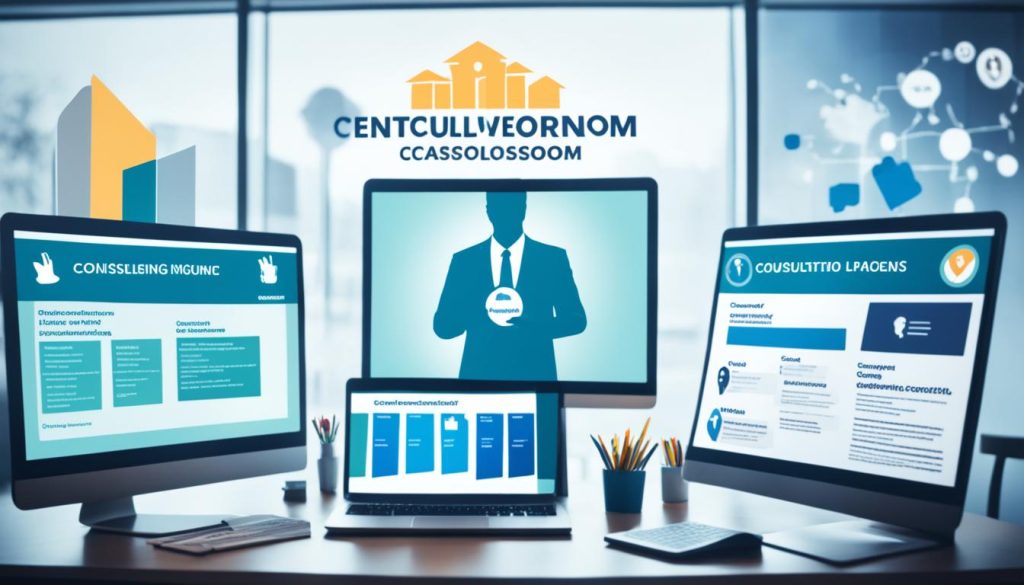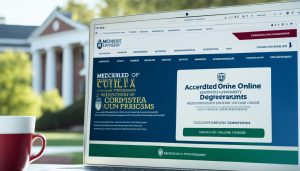Welcome to Webster University’s online Master of Arts (MA) in Counseling program, where we empower aspiring counselors like you to advance their careers and make a positive impact in the lives of others. Our fully virtual program offers the flexibility and convenience you need to pursue a master’s degree in counseling at your own pace and on your own schedule.
At Webster University, we understand that you have commitments and responsibilities outside of your education. That’s why our online format allows you to balance your coursework with your personal and professional obligations. Whether you choose to study part-time or full-time, our program is designed to accommodate your needs and support your success.
Key Takeaways:
- Webster University offers a flexible online format for their Counseling MA program.
- The program covers a comprehensive range of counseling topics and approaches.
- Faculty members are experienced counselors who provide mentorship and guidance.
- Students have the option to customize their degree based on their interests and goals.
- The program is accredited by the Council for Accreditation of Counseling and Related Educational Programs (CACREP).
A Career-Focused Curriculum That Supports Your Goals
Webster University’s Counseling MA program offers a comprehensive curriculum designed to equip students with the knowledge and skills necessary for a successful career in mental health and human services. With a focus on practical experience and personal growth, our program prepares future counselors to help clients overcome emotional difficulties, gain insights into their challenges, and make positive lifestyle changes.
The curriculum emphasizes the importance of self-awareness and interpersonal communication skills, which are essential for building effective relationships with clients. Through a combination of coursework and hands-on learning practicums, students develop a deep understanding of counseling approaches, human development, trauma, substance abuse, and family counseling.
Our program’s flexible nature allows students to tailor their education to align with their personal and professional goals. In addition to the core curriculum, students have the opportunity to choose elective courses that further specialize their knowledge in areas of interest. This customization ensures that our graduates are equipped with the specific skills needed to excel in their chosen counseling career path.
“The program at Webster University provided me with a holistic approach to counseling, emphasizing both theoretical knowledge and practical skills. It prepared me to work effectively with clients from diverse backgrounds and empowered me to make a meaningful impact on their lives.” – Emily Watson, Counseling MA graduate
Course Highlights
- Counseling Approaches: Explore various theories and techniques used in counseling practice.
- Human Development: Gain a comprehensive understanding of human growth and development across the lifespan.
- Trauma Counseling: Learn strategies for supporting individuals who have experienced traumatic events.
- Substance Abuse Counseling: Develop skills to assist clients dealing with addiction and substance abuse.
- Family Counseling: Understand the dynamics of family systems and learn strategies for facilitating healthy relationships.
Hands-On Learning
In addition to coursework, our Counseling MA program provides hands-on learning opportunities through practicum experiences. These supervised placements allow students to apply their knowledge and skills in real-world settings under the guidance of experienced professionals. By working directly with clients, students develop the practical skills and confidence needed to succeed as counselors.
| Advantages of Webster University’s Counseling MA Program | Traditional On-Campus Programs |
|---|---|
| Flexible online format for coursework | Restrictive class schedules |
| Virtual master’s degrees in counseling | Programs limited to physical locations |
| Customizable curriculum to suit personal and professional goals | Fixed curriculum with limited elective options |
| Hands-on learning practicums | Less practical experience opportunities |
Collaborate with Faculty Mentors
Webster University’s Counseling MA program offers the opportunity to learn from experienced faculty members who have professional backgrounds in counseling. These mentors take a real-world approach to teaching, providing students with valuable insights and guidance in developing cultural awareness. This cultural competence is crucial for effectively serving a diverse population in the field of counseling.
One of the key advantages of Webster University’s Counseling MA program is the small class sizes, which foster personalized attention and meaningful collaboration with professors who serve as mentors. Students have the opportunity to work closely with faculty members, engaging in research projects and benefiting from their extensive professional networks within the counseling field.
Whether students choose to pursue their master’s degrees in counseling online or in-person, they can expect to have access to dedicated faculty mentors who are committed to their success.

Faculty Mentorship Benefits
- Personalized attention and guidance from experienced counselors
- Opportunity to collaborate on research projects
- Access to professional networks in the counseling field
- Real-world insights into counseling practice
- Cultural awareness development
“Having faculty mentors who are practicing counselors has been invaluable in my journey towards becoming a counselor. They not only provide academic guidance but also share their real-world experiences, which has deepened my understanding of the field.” – Emily Adams, Counseling MA student
Whether you choose to pursue a virtual counseling graduate program or prefer an in-person learning experience, the faculty mentorship offered by Webster University’s Counseling MA program sets you up for success in your future counseling career.
Table
| Program Format | Faculty Mentorship | Collaboration Opportunities |
|---|---|---|
| Online | Available | Virtual research projects and networking events |
| In-Person | Available | In-person research projects and networking events |
Enjoy the Flexibility of a Customized Degree
Webster University’s Counseling MA program offers flexibility and customization based on students’ interests and career goals. Whether you prefer to study in-person or online, Webster University has options to suit your needs. You can choose to complete your coursework at one of Webster’s U.S. locations, online from the comfort of your own home, or even in Geneva, Switzerland.
The program is designed to accommodate both full-time and part-time study, allowing you to balance your schoolwork with your professional obligations. This flexibility makes Webster University’s Counseling MA program accessible to individuals who may not be able to relocate or attend classes on a traditional campus.
Whether you are looking to advance your career in Clinical Mental Health Counseling or Community Counseling, Webster University offers a customizable degree that can empower you to reach your goals.

Experience the convenience and flexibility of earning your master’s degree in counseling virtually.
Feel Confident in Our CACREP Accreditation
Webster University is proud to hold accreditation from the Council for Accreditation of Counseling and Related Educational Programs (CACREP) for its Counseling MA program. The program is offered at Webster’s campuses in St. Louis, Missouri, Columbia, and Myrtle Beach, South Carolina, ensuring a high standard of education and preparing students for successful careers in counseling.
Notably, Webster University’s online Counseling MA program is also CACREP accredited, providing students with the flexibility to pursue a master’s degree in counseling from anywhere in the world. The program’s online format maintains the same rigorous standards as the on-campus programs, allowing students to feel confident in the quality of education they will receive.
Furthermore, Webster University’s Counseling MA program in Geneva, Switzerland, is accredited by the Swiss Association for Counselling, further demonstrating its commitment to meeting international standards of excellence in counseling education.

Accreditation by CACREP is a significant milestone for the program, as it ensures that Webster University’s Counseling MA program adheres to strict criteria for program content, faculty qualifications, and student outcomes. CACREP accreditation is highly regarded and recognized as a marker of quality in the counseling profession.
By choosing an accredited program like Webster University’s Counseling MA program, students can feel confident that they will receive the education and training necessary to excel in the counseling field.
Student Testimonial:
“Having a CACREP accredited program provided me with the assurance that I would receive a high-quality education and be well-prepared for my career as a counselor. It also gave me confidence that my degree would be recognized by employers and licensing boards. I am grateful to have had the opportunity to attend Webster University’s Counseling MA program.”
– Emily Johnson, Counseling MA Graduate
What Can You Do With a Master of Arts in Counseling?
A Master of Arts in Counseling provides the knowledge, skills, and credentials to pursue a rewarding career as a counselor. Graduates can work in various settings, such as counseling agencies, private practice, schools, correctional facilities, and substance abuse treatment centers. With the demand for mental health counselors projected to grow significantly, earning a counseling master’s degree can lead to opportunities in positions such as Correctional Treatment Specialist, Marriage and Family Therapist, Mental Health Counselor, School Counselor, and Substance Abuse Counselor. The U.S. Bureau of Labor Statistics projects a 23% growth in demand for mental health counselors from 2020 to 2030.
Having a Master of Arts in Counseling opens doors to diverse career paths, allowing professionals to make a positive impact on individuals, families, and communities. Whether providing one-on-one therapy, guiding students through academic and personal challenges, or helping individuals overcome substance abuse, counselors play a critical role in enhancing mental well-being and promoting healthy lifestyles.
Here are some potential career options for individuals with a Master of Arts in Counseling:
- Mental Health Counselor: Provide individual counseling, help clients develop coping strategies, and assist with behavioral and emotional challenges.
- Marriage and Family Therapist: Work with couples and families to improve communication, resolve conflicts, and strengthen relationships.
- School Counselor: Support students in their academic, social, and emotional development, helping them navigate challenges and plan for their future.
- Correctional Treatment Specialist: Assist individuals in the criminal justice system with their rehabilitation and reintegration into society.
- Substance Abuse Counselor: Help individuals overcome addiction through counseling, support groups, and educational programs.
These are just a few examples of the many career paths available to those with a Master of Arts in Counseling. Graduates may also choose to specialize in specific populations or areas of counseling, such as career counseling, trauma counseling, or geriatric counseling.
How to Become a Counselor After Earning a Master’s in Counseling Degree
After earning a Master’s in Counseling degree, you are one step closer to pursuing a fulfilling career as a licensed counselor. To become a licensed counselor, you must meet the licensure requirements of your state, which typically include the following steps:
- Obtain a degree from an accredited institution: Ensure that your Master’s degree in Counseling is from an accredited institution. This accreditation validates the quality of your education and prepares you for the counseling profession.
- Complete supervised internships: Many licensing boards require a specific number of supervised counseling hours to gain practical experience. These internships provide hands-on training and a chance to apply your counseling skills under the guidance of experienced professionals.
- Pass a licensure exam: In most states, passing a licensure examination is a requirement to become a licensed counselor. These exams assess your knowledge of counseling theories, ethics, and practices. It is essential to review and prepare thoroughly for the exam.
- Network and volunteer: Building a professional network and gaining relevant experience through volunteering can enhance your employability and open doors to new opportunities in the counseling field. Connect with other counselors, join professional associations, and seek out volunteer positions that align with your counseling focus.
- Continuing education: Staying updated on the latest developments in the field is crucial for counselors. Continuing education courses or workshops help you expand your knowledge, refine your counseling techniques, and maintain your licensure.
With a Master’s in Counseling degree, you can pursue various career paths in counseling agencies, private practice, schools, government agencies, and more. The demand for mental health counselors is projected to grow significantly in the coming years, offering ample opportunities for those with a counseling master’s degree.

“Becoming a licensed counselor is a rewarding and fulfilling journey. With the right qualifications, practical experience, and commitment to ongoing learning, you can make a positive impact on the lives of others.”
Conclusion
Earning an online master’s degree in counseling can be a transformative experience that enables individuals to make a positive impact on the lives of others. Webster University offers a flexible and accredited Counseling MA program specifically designed to prepare students for successful careers in the fields of mental health and human services. With a comprehensive curriculum, dedicated faculty mentorship, and customizable degree options, Webster University provides the essential tools and support required for individuals to advance their careers in counseling.
By pursuing an online master’s degree in counseling, students gain a deep understanding of counseling approaches, human development, trauma, substance abuse, family counseling, and more. This holistic education equips graduates with the knowledge and skills to address the diverse needs of their clients and make a meaningful difference in their well-being. The convenience and flexibility of online learning make it possible for students to pursue their degree while managing personal and professional commitments.
Start your journey towards an online master’s degree in counseling at Webster University and unlock your potential to help others thrive. Whether you aspire to work in counseling agencies, private practice, schools, or government agencies, this program will provide you with the necessary training and credentials to pursue a fulfilling and rewarding career in the counseling field. Take the first step today and embark on a path that allows you to make a lasting impact on individuals and communities.




No comments! Be the first commenter?